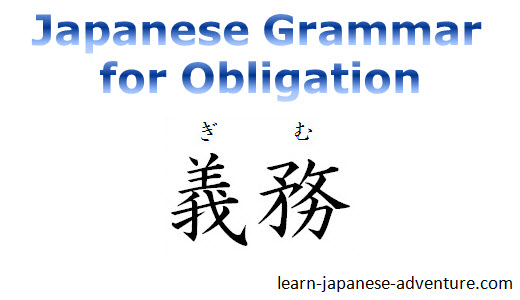- Home
- Intermediate Lessons
- Japanese Grammar for Obligation
Japanese Grammar for Obligation -
Intermediate Lessons: 16
In the previous lesson, you have learned the Japanese grammar on permission (you may do something) and prohibition (you must not do something).

In this lesson, you will learn grammar on obligation (you must do something) and no obligation (you don't have to do something).
Sentence Patterns
It's always much easier to understand the grammar with the sentence patterns than to explain in plain words.
| Verb (ない-form |
No Obligation |
| Verb (nai-form |
You don't have to do ~/ You need not do ~ |
| Verb (ない-form |
Obligation 義務 (gimu) |
| Verb (nai-form |
You have to do ~/You must do ~ |
The two grammars are formed by using ない-form (nai-form).
Although the grammar Verb (ない-form ない) なければいけません is in negative form (~ません), its meaning is positive (you have to do ~).
On the contrary, though the grammar Verb (ない-form ない) なくてもいいです is in positive form (~です), its meaning is negative (you don't have to do ~).
Let's take a look at some examples...
|
1. |
早くおきなければいけません。 |
|
2. |
学校へ行かなければいけません。 |
|
3. |
宿題をしなければいけません。 |
|
4. |
朝薬を飲まなければいけません。 |
Questions and Answers in Japanese Grammar for Obligation
How do you ask a question whether you need to do something? And how do you answer the question? I think you should have known the answer.
It's easy, right? Just add the question word か (ka) to the Japanese grammar. Since this is a Yes/No question, the answer should begin with はい (hai) or いいえ (iie).
For positive meaning,
Verb (ない-form ない) なければいけません - I have to do something.
Verb (ない-form ない) なければいけませんか - Do I have to do something?
The sentence patterns for positive questions and answers will be...
| Question: | Verb (ない-form |
| Do I have to do something? | |
| Answer Yes: | はい、Verb (ない-form |
| Yes you have to do... | |
| Answer No: | いいえ、Verb (ない-form |
| No you don't have to do... |
For negative meaning,
Verb (ない-form ない) なくてもいいです - I don't have to do something.
Verb (ない-form ない) なくてもいいですか - Don't I have to do something?
The sentence patterns for negative questions and answers will be...
| Question: | Verb (ない-form |
| Don't I have to do something? | |
| Answer No: | はい、Verb (ない-form |
| No you don't have to do... | |
| Answer Yes: | いいえ、Verb (ない-form |
| Yes you have to do... |
As mentioned in the last lesson, "はい (hai)" in Japanese actually means "I agree with what you said" and not simply a direct translation of "Yes" in English.
Similarly, "いいえ (iie)" means "I disagree with what you said" and not directly translated to "No" in English.
Therefore there are differences in the Japanese answers and the English translations when you answer "Yes" or "No" to a negative question.
Examples for Questions and Answers in Japanese Grammar for Obligation
Let's use an example to explain both the positive and negative questions and answers for this Japanese grammar.
For positive questions and answers...
| Question: | 漢字で書かなければいけませんか。 |
| kanji de kakanakereba ikemasen ka | |
| Meaning: Do I have to write in Kanji? | |
| Answer Yes: | はい、漢字で書かなければいけません。 |
| hai, kanji de kakanakereba ikemasen | |
| Meaning: Yes, you have to write in Kanji. | |
| Answer No: | いいえ、漢字で書かなくてもいいです。 |
| iie, kanji de kakanakutemo ii desu | |
| Meaning: No, you don't have to write in Kanji. |
For negative questions and answers...
| Question: | 漢字で書かなくてもいいですか。 |
| kanji de kakanakutemo ii desu ka | |
| Meaning: Don't I have to write in Kanji? | |
| Answer No: | はい、漢字で書かなくてもいいです。 |
| hai, kanji de kakanakutemo ii desu | |
| Meaning: No, you don't have to write in Kanji. | |
| Answer Yes: | いいえ、漢字で書かなければいけません。 |
| iie, kanji de kakanakereba ikemasen | |
| Meaning: Yes, you have to write in Kanji. |
When Answering to Superiors/Customers
The tone is too strong when you are answering with Verb (ない-form ない) なければいけません - "You have to do something / You must do something".
It's normally used by parents to children or teachers to students. If you are answering to your superiors, boss or customers, it sounds too rude.
Therefore when answering to your superiors, boss or customers, you will normally use the Japanese grammar in request form "Verb (て-form) ください" to be more polite.
In the previous example, use 書いてください (kaite kudasai) to replace 書かなければいけません (kakanakereba ikemasen) to make it more polite.
When to ask Positive Question or Negative Question?
Both positive question and negative question will be used depending on situation.
For example, in a test, everyone is using pencil to write one's answers except you, who want to use pen. In this situation, what would you ask your teacher?
|
1. |
Positive: 鉛筆で書かなければいけませんか。 (enpitsu de kakanakereba ikemasen ka) OR |
|
2. |
Negative: 鉛筆で書かなくてもいいですか。 (enpitsu de kakanakutemo ii desu ka) |
In this situation, it seems like you have to use pencil since everyone is using pencil. Therefore you should ask the positive question "鉛筆で書かなければいけませんか。 - Do I have to write in pencil?"
After the test, when you submit your paper to your teacher, you saw that no one has written his/her name on the test paper except you. Everyone only wrote down his/her serial number.
You are surprised. You thought you must write your name and serial number on the test paper. In this situation, what should you ask your teacher?
|
1. |
Positive: 名前を書かなければいけませんか。 (namae wo kakanakereba ikemasen ka) OR |
|
2. |
Negative: 名前を書かなくてもいいですか。 (namae wo kakanakutemo ii desu ka) |
In this situation, it seems like it's not required to write your name on the test paper since everyone only wrote his/her serial number.
Therefore you should ask the negative question "名前を書かなくてもいいですか。 - Don't I have to write my name?"
Difference between なければいけません and なければなりません
| Verb (ない-form |
Obligation 義務 (gimu) |
| Verb (nai-form |
You have to do ~/You must do ~ |
| Verb (ない-form |
Obligation 義務 (gimu) |
| Verb (nai-form |
You have to do ~/You must do ~ |
In general, you can use either of the Japanese grammars as both of them have the same meaning. However, native Japanese use them with slight difference.
For ~なければいけません (~nakereba ikemasen) - you want to do something and you think that you have to do it.
For ~なければなりません (~nakereba narimasen) - you don't want to do something but you have no choice and have to do it. So normally, this is used when you want to make excuses.
For example, your friend invites you to go for dinner with him/her. You can say the following...
- すみません。明日は試験だから、今晩勉強しなければなりません。
sumimasen. ashita wa shiken da kara, konban benkyou shinakereba narimasen
Meaning: I am sorry. There is an exam tomorrow, therefore I have to study tonight.
In fact, the Japanese grammar ~なければなりません (~nakereba narimasen) is more commonly used by native Japanese than ~なければいけません (~nakereba ikemasen).
Mystery Sales! Get 45% Forever OFF Premium & Premium PLUS! Ends on 20 Feb 2026
The link above is an affiliate link, which means that I would earn a commission (at no extra cost to you) if you do end up purchasing the related learning course.
Buy me a coffee







